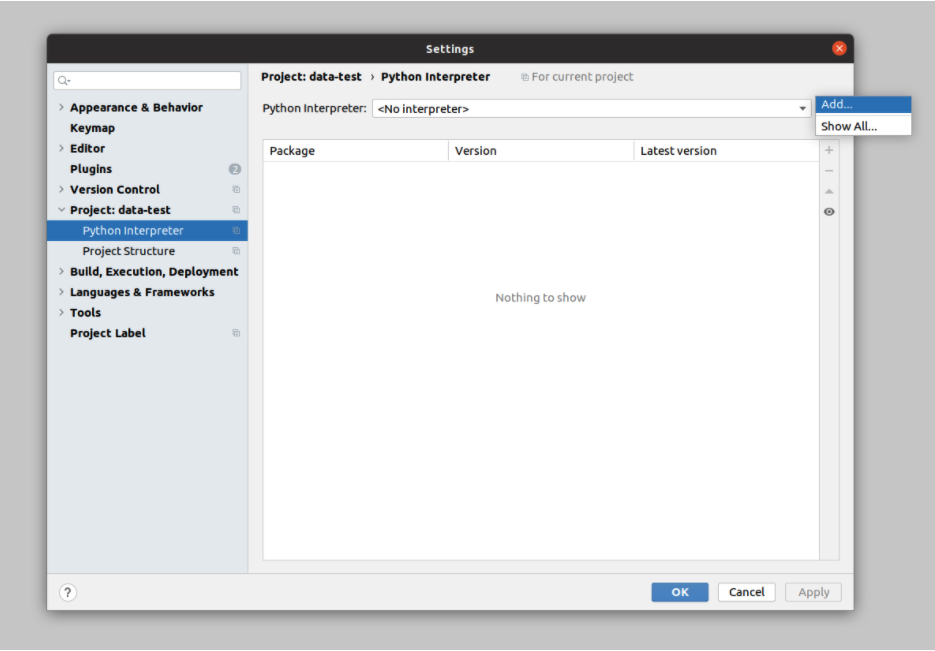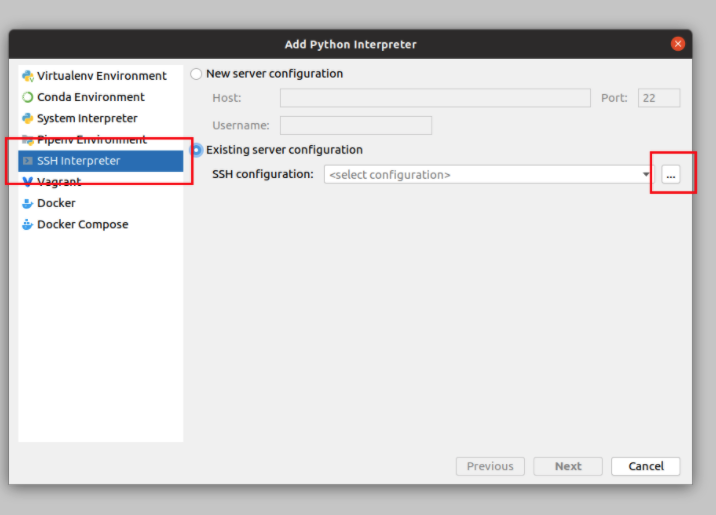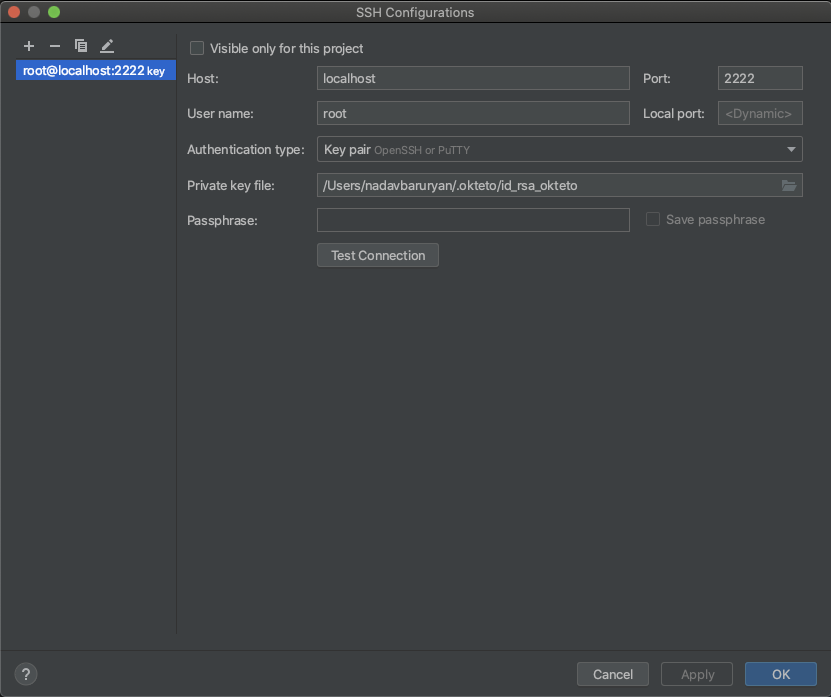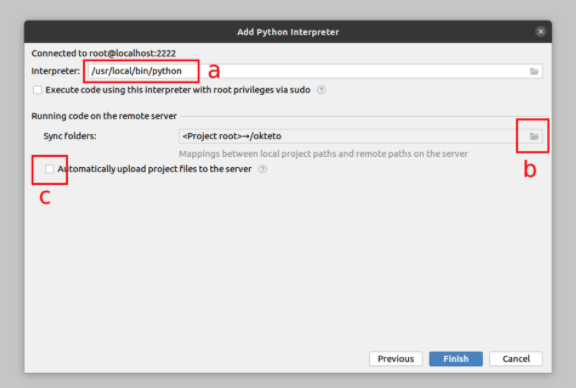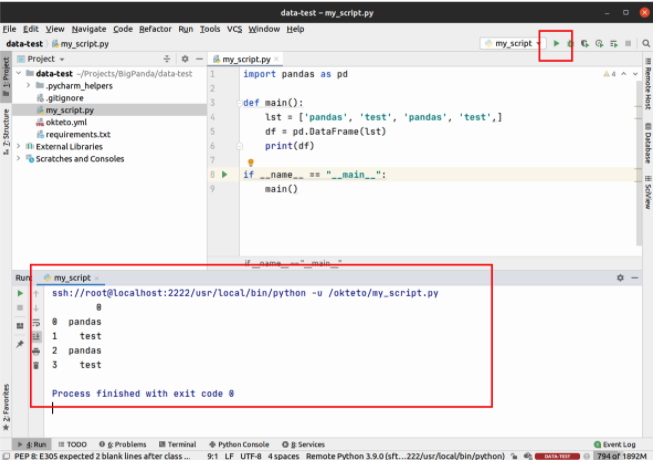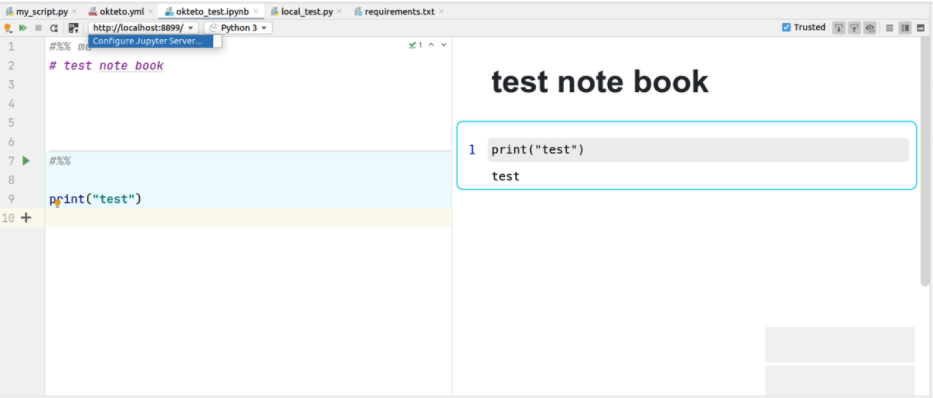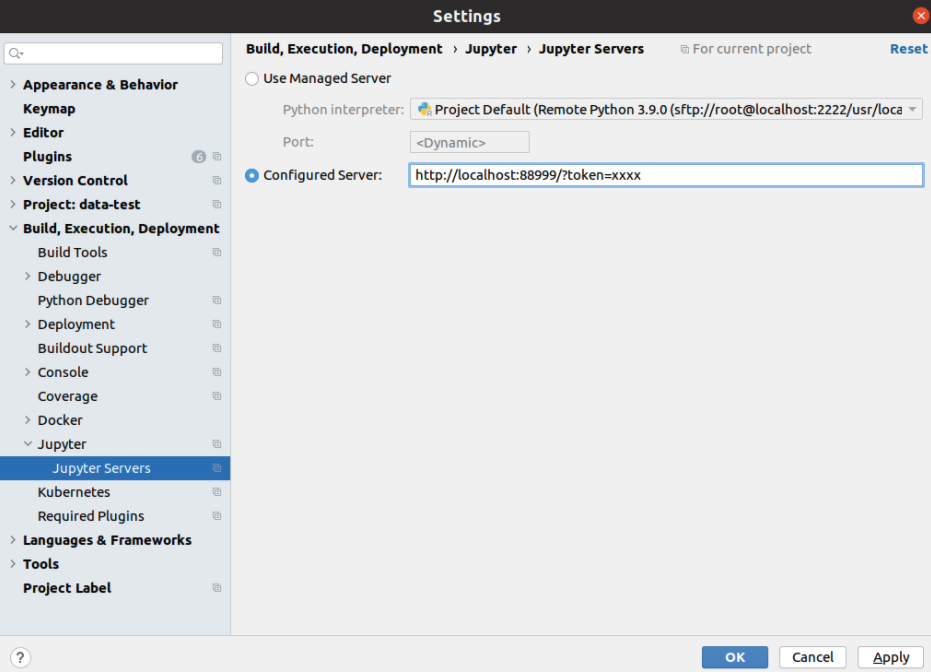main contributes:
- Yahel Agassi - yahel@bigpanda.io
- Nadav Bar Uryan - nadav.bkl@gmail.com
- Install the following:
- PyCharm Professional
- kubectl v1.16 brew install kubectl
- kubectx brew install kubectx
- awscli v2
- okteto cli - brew install okteto
- Update AWS toolkit plugin on PyCharm to the latest version
- Download kubeconfig for the cluster
aws eks update-kubeconfig --region <your-region> --name <context-name> --alias <context-alias> - Switch to context
- Create you namespace
kubectl create ns <YOUR-NAME>
- Make sure you’re using the correct AWS profile and K8s context
kubectx - select context
- In your project’s root directory create a file called okteto.yml with content below. Replace the with your values, and define CPU and memory resources. The rest of the file should stay unchanged.
name: <PROJECT_NAME>
# define time-to-live (to reduce costs)
annotations:
janitor/ttl: "12h"
# define resources
resources:
requests:
memory: "20G"
cpu: "4"
limits:
memory: "30G"
cpu: "6"
forward:
- 8899:8899 # jupyter notebook port
# define ENVs below in your ~/.zshrc or ~/.bashrc
environment:
- PYTHONPATH=/okteto
# Choose instance type using tolerations.
# Valid keys are aws/spot, aws/on-demand, aws/on-demand-gpu
tolerations:
- key: aws/spot
operator: Exists
### Don't change the content below.
image: okteto/python:3
command:
- bash
volumes:
- /root/.cache/pip
- /root/.local/lib/python3.9/site-packages
- /root/.local/bin/
sync:
- .:/okteto
workdir: /okteto
remote: 2222
autocreate: true
** recommend installing janitor in k8s cluster https://codeberg.org/hjacobs/kube-janitor
** we use taints and tolerations to specify which machines we want okteto to get us https://kubernetes.io/docs/concepts/scheduling-eviction/taint-and-toleration/
- In your project’s root directory create a file called .stignore with the content below. Fill in your local folders and files you wish to ignore and not to sync with Okteto. Large and unwanted folders are good to ignore. (Additional reading: https://docs.syncthing.net/users/ignoring.html)
ignore unwanted folders
- venv
- .pytest_cache
Important - never ignore .pycharm_helpers as the remote interpreter uses this folder
- Start Okteto
okteto up
NOTICE: If there are not enough resources available, k8s will launch a new worker node. This can take time and okteto up may sometimes fails with this error: couldn't activate your development container: kubernetes is taking too long to create your development container. Please check for errors and try again In this case just rerun okteto up.
- When Okteto is up, you’ll be dropped into a shell inside the development pod, with all your project’s files in the current directory. Inside the pod, install your project’s Python dependencies.
pip install --user -r requirements.txt
- Configure your Git username/email in okteto
git config --global user.name "FIRST_NAME LAST_NAME"
git config --global user.email "MY_NAME@example.com"
- Open PyCharm settings > Project > Python interpreter > ⚙️ icon > Add
- Choose SSH interpreter > Existing server configuration > click on the three dots button
-
Click on the + sign and fill up the fields as in the image below. Change the Private key path to your home directory: /Users//.okteto
When you run okteto up the first time, Okteto will create a SSH key pair for you and save it at $HOME/.okteto/id_rsa_okteto and $HOME/.okteto/id_rsa_okteto.pub. The SSH server launched in your development environment will be automatically configured to use these keys for authentication.
- Click OK and next, to get to final configuration screen.
- Update the path to the interpreter to /usr/local/bin/python .
- Set the remote path to /okteto
- Disable file uploading, since Okteto will automatically take care of this for you.
When your code is ready, you can run it remotely inside the development pod from PyCharm “Run” button.
okteto down
- Make sure you’ve set forward in your okteto.yml
forward:
- 8899:8899 # jupyter notebook port
-
Start your development pod with
okteto up -
Inside your development pod, install Jupyter (only once)
pip install --user jupyter -
Inside your development pod, start notebook server
/root/.local/bin/jupyter notebook --port=8899 --no-browser --allow-root
to open jupyter in detach mode, run the following
kubectl get pods
kubectl exec -it <pod name> —- bash
apt install -y screen
screen -d -m -S jupyterServer -c '/root/.local/bin/jupyter notebook --port=8899 —no-browser —allow-root’
press - ctrl + a + d
Copy the url from the output and, replace the port with the local port from step 1: 8899 http://localhost:8899/?token=xxxx
- Copy the url from the output and, replace the port with the local port from step 1: 8899 http://localhost:8899/?token=xxxx
- In PyCharm, open a notebook and click on configure Jupyter server
- Choose “configured server“ and paste the url
if running jupyter in screen mode and due to network issue the connection is lost to the pod (and you cannot reconnect to the notebook) run the following command in the local terminal - not oktteto terminal :
- check that there is no active processes listening on the port 8899:
- lsof -i:8899 (apt install lsof if needed) result should be empty
- get pod name using - kubectl get pods
- adjust the port forwarding using the
- kubectl port-forward --address localhost pod/< pod name> 8899:8899
In your okteto container (after okteto up)
-
Install vim
apt update; apt install vim -y -
Create iPython configuration file for simpler handling of Jupyter notebooks with module
imports:
pip install --user ipython
ipython profile create # or /root/.local/bin/ipython profile create
cd /okteto/
mv /root/.ipython/profile_default/ipython_kernel_config.py .
3) Edit the configuration file vim /okteto/ipython_kernel_config.py
With this line:
c.InteractiveShellApp.exec_lines =['import sys; sys.path.append("/okteto")']
- Launch a notebook that imports local modules and it should work fine now You can check it by running the next commands from python notebook:
import sys
sys.path
The second path should be: “/okteto”
